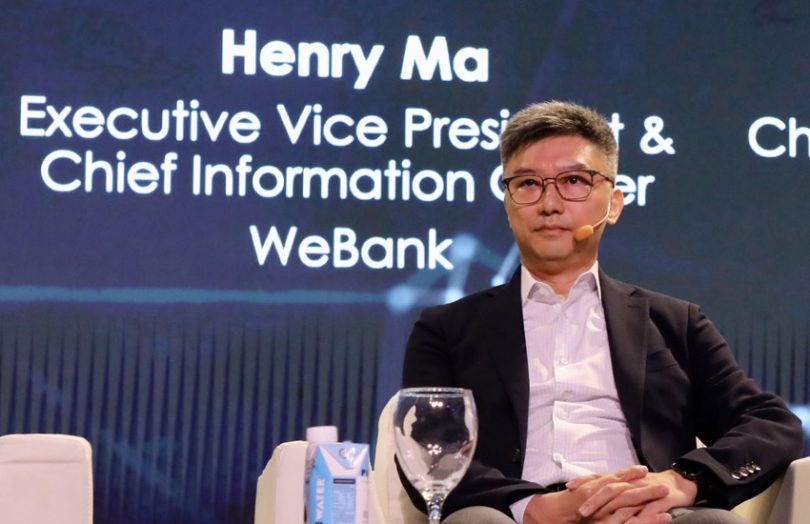This is a guest opinion post from Henry Ma, Executive Vice President and Chief Information Officer of WeBank.
All bonds are built on trust. In the unpredictable post COVID-19 era, businesses face unprecedented challenges, and the need to build and transmit trust between institutions under these conditions remains of paramount importance. By its very nature, blockchain helps to improve multi-stakeholder trust and can be leveraged to achieve greater collaboration in this regard.
Over the past decade, a growing number of blockchain applications across industries and business scenarios have consolidated a “New Infrastructure” of the digital economy, paving the way to unleash untapped sources of data, empower industry integration and accelerate asset digitization.
In a world that is both more interconnected than ever (e.g. technology, supply chains) and simultaneously disconnected (e.g. travel bans, quarantine mandates), we at WeBank anticipate an expansion in blockchain-enabled business scenarios in 2021 to re-ignite and fuel business opportunities.
Unleash the Power of Data
Data is a fundamental resource in the digital economy and plays a key role in the new infrastructure. There are currently heated discussions on how to unleash the power of data to make meaningful contributions within each industry. Massive troves of data are already being exchanged and this trend is only anticipated to accelerate in many countries. In reaction, further policy and regulation enactments are expected to define the rules and safe use of such handling or transferring sensitive personal data.
Data exchange may sound simple; however, the isolation of many smaller data sets has actually caused an under-utilization of existing data. This is because meaningful insights from much of the data can only be drawn from a larger, more holistic view of the individual or business. Such a view would require some degree of consolidation or aggregation of these data silos, but it leads to concerns of data rights determination, and increasing compliance risk and complexity brought by personal data protection policies.
To draw on these siloed data sources, we believe that secure storage, trusted transfer methods, and collaborative production are three core issues which enterprises must tackle in 2021. One breakthrough of blockchain in 2021 will be in how the technology integrates with other advanced technologies (e.g. AI, Cloud, and Data analytics) to solve the above three key issues.
Empower Industry Integration
The booming digitization is accelerating the development of the industrial internet. It requires big data computing resources in order to empower the in-depth sharing and collaboration of a trusted resource network. This can be achieved through three aspects:
1. Lowering operating costs:
Blockchain introduces new tools and paths for the development of the industrial internet. The value that blockchain brings includes trust while reducing the complexity from intermediaries. It enables information sharing and transaction verification. Business processes are greatly improved, operation is enhanced and efficiency is increased. These benefits allow enterprises to lower their overall operating costs and move one step closer to becoming eco-friendly.
2. Upgrading business models and innovate revenue structures:
Blockchain is no longer an armchair strategy; digitization of industries present tremendous opportunities for the implementation of blockchain, especially under COVID-19. Apart from lowering operating costs, blockchain is also expected to boost business model and revenue structure innovation with its comprehensive cryptography, complete traceability, and ability to enable deeper collaboration.
3. Supporting the real economy:
In the near future, blockchain will drive the integrated development of finance and other industries. We believe that financial integration will create new cross-industry financial scenarios for blockchain. Conversely, the deepened collaboration will also produce more innovative financial products with a higher level of digitization and informatization.
Accelerate Asset Digitization
Dispute and legal concerns are serious due to ambiguous data rights frameworks. Yet, with the help of blockchain, pre-determined data rights are offered to the network of users of digital assets. Blockchain-based digital assets are gaining increasingly wide adoption as increasingly strict regulation comes into effect.
In 2021, we expect that services, products and assets will be mostly backed by digitization or blockchain in the digital economy. Central Bank Digital Currency (CBDC) will become one of the most effective settlement tools for such digital assets, laying the key financial infrastructure foundation for the digital economy.
Now, as we approach the turn of the 2020-2021 year – a time where the global pandemic is still severe and trade conflicts still fresh – enterprises are facing serious challenges. Blockchain is in a strong position to play an important role in the exchange of trust and information. Collaborative business, a blockchain-based business model which entails sharing resources and information across businesses and country borders, is becoming a new business option for enterprises in 2021.
Indeed, digital technologies are transforming the trust paradigm in the business world and are laying the foundation for collaborative business. At the same time, the inclusiveness of trust will redefine business borders with continuous innovation and further speed up the development of collaborative business with blockchain-based solutions.






